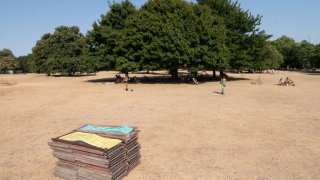
- Last month was England driest July since 1935, more than eight decades, according to provisional statistics released Monday from the Met Office, the national meteorological service for the United Kingdom.
- Climate change driven by humans has contributed to the droughts.
- The decadeslong record for dry weather is also a part of what contributed to recent wildfires throughout the region.
England just experienced its driest July since 1935, according to provisional statistics released Monday from the Met Office, the national meteorological service for the United Kingdom.
England had 23.1 millimeters of rain in July, which is less than one inch. That's 35% of England's average rainfall for the month, according to the Met Office.
Wales had about two inches of rain, which is 53% of its monthly average; Northern Ireland had 1.8 inches of rain, or 51% of its monthly average and Scotland had about 3.3 inches of rain, 81% of its average reading.
Get DFW local news, weather forecasts and entertainment stories to your inbox. Sign up for NBC DFW newsletters.
Taken together, all of the United Kingdom had 56% of its average monthly rainfall for the month of July.
Climate change driven by humans has contributed to the droughts.
"Fluctuations in weather patterns determine when and where heat waves and unusually dry spells take place, but the higher temperatures and thirstier atmosphere due to human-caused climate change will have intensified the rate at which soils dry out and hence speed up the development of drought," Richard P. Allan, a professor of climate science at the University of Reading Department of Meteorology, told CNBC.
Money Report
The decadeslong record for dry weather is also a part of what contributed to recent wildfires throughout the region — and many other parts of Europe. Regional heat waves are the other half of the wildfire equation: A hot, dry season leaves vegetation a veritable tinderbox.
Tuesday, July 19, was the busiest day for the fire department in London since World War II, according to Sadiq Khan, the city's mayor.
"It is important for us to recognize that one of the consequences of climate change and these sorts of temperatures" is they can lead to these types of fires, Khan said in an interview on Sky News on July 20.
"The challenge in London is we have a lot of grass, a lot of green spaces and a lot of that impinges on properties. And when you have not had rain for a long period, when the grass is incredibly dry, fires can start very quickly and spread even faster, because of wind and that leads to properties being destroyed," Khan said.
Indeed, July 19 was a scorcher. The Met Office has since announced that Coningsby, Lincolnshire, reached 40.3 degrees Celsius, or 104.5 degrees Fahrenheit, that day. It is the first time the United Kingdom has recorded a temperature that high.
The provisional statistics from the Met Office are based on climate data from 270 weather stations throughout the U.K. Over the coming weeks, the office is expected to tabulate data from hundreds of additional climate and rainfall stations to be included in its final figures.






